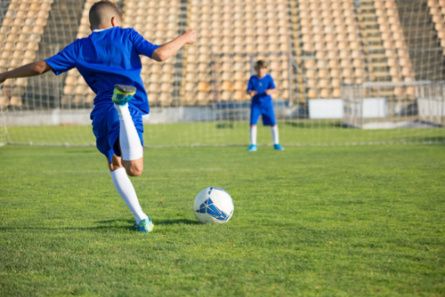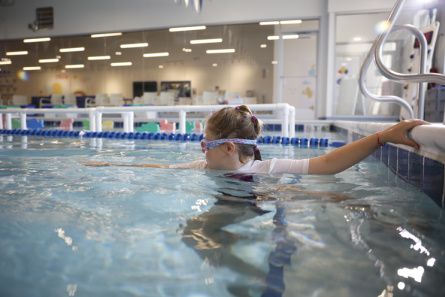6 Incredible Benefits of Swimming for Athletes
Athletes who take their sport seriously are constantly training. Of course, they’re focused on their team and position when playing games or matches each week, but they know they can’t just coast during the off-season. They may run, lift weights, or play other sports to stay in shape.
If they’re really on top of things, they may even be unlocking the numerous benefits of swimming for athletes—a powerhouse exercise that checks the boxes for virtually any sport you can name.
Is swimming good for basketball players? Yes! You’re building cardiovascular fitness and flexibility.
Is swimming good for football players? Absolutely! Swimming is a whole-body workout that’s great for muscles, joints and endurance.
Is swimming good for soccer players? You guessed it—it’s a great low-impact exercise that keeps you in kicking shape.

Ballerinas, tennis players, wrestlers, sprinters, volleyball players—swimming is good for athletes of all kinds. Let’s explore the evidence that makes this fun, valuable, and lifelong skill a great idea for any athlete.
6 Benefits of Swimming for Athletes of Any Sport
Athletes need honed skills, proper training, and physical fitness to get the most out of their bodies. Whether they’re kicking a soccer ball downfield or racing to the finish line on the track, they must rely on their ability to perform in order to succeed.

Swimming delivers on all counts.
1. Enhanced Cardiovascular Fitness
A healthy cardiovascular system provides oxygen-rich blood throughout the body. This is pivotal when performing demanding athletic feats. Studies have shown that swimmers scored equal to runners for cardiovascular health markers and higher than walkers and non-exercisers.
Swimming delivers these benefits while being gentler on your body than running. It’s great for your heart and trains your body to use oxygen more efficiently.
As athletes utilize swim training to build cardiovascular stamina, their hearts are able to pump blood and oxygen through the body for longer stretches of time. Such stamina is essential for lacrosse, hockey, and basketball players who must make their way from one end of the field, rink, or court as quickly as they can.
2. Low-Impact Exercise
We mentioned above that swimming is gentler on your body than running—and that may be its greatest advantage over other exercises that offer many of the same benefits. The buoyancy of the water makes swimming easy on your joints and muscles, but it’s still a great workout.
Swimming for 30 minutes is equal to 45 minutes of exercise on land. It’s easy on your body and provides a more efficient, effective workout in less time. What’s not to love?
3. Improved Muscle Strength and Flexibility
Can you really bulk up in the pool? It won’t deliver the same gains as lifting weights, and your body won’t develop in the same way. However, the resistance of the water means that every movement takes more effort, helping you build muscle strength more efficiently than engaging in cardio activities on land.
Your flexibility stands to benefit as well. As a whole-body workout, the range of motion required by swimming helps make joints and ligaments looser and more flexible. If you devote a bit of your time in the pool to stretching, you’ll find you can hold difficult poses longer because of the buoyancy factor.
4. Increased Endurance and Stamina
We keep coming back to the point of a whole-body workout, but it’s one of swimming’s greatest advantages. Swimming is fun and easy on your joints, but it also takes real work to maintain because of the resistance of the water.
If you can mimic some of the routines you perform in your favorite sport while in the pool, you’ll eventually find it much easier to practice that sport for longer because of all that water resistance. You’re training your body in a more challenging environment and increasing your stamina.
5. Enhanced Breathing Techniques
Breath control is essential for swimmers. Many strokes and swim styles result in your face being underwater for at least some of the time, so you need to be smart about how often and when you can take each breath. That level of control can be beneficial in countless sports—giving you the freedom and discipline to take a breath when it makes the most sense.
6. Mental Resilience and Focus
Swimming has numerous documented mental health benefits, such as releasing dopamine and serotonin. It also increases blood flow to the brain, which has been associated with improved cognitive function.
Mental resilience? Committing to any sport or exercise regimen can work those muscles, so we won’t claim they’re unique to the pool. But swimming can still be a great, low-impact way to maintain that winner’s mentality between or even during seasons.
Schedule a Trial Lesson with Big Blue Today
If your student athlete doesn’t know how to swim or lacks confidence in the pool, it’s time to change that. Besides the sensational benefits of swimming for athletes that we’ve covered, water safety for kids is an essential skill that leads to a lifetime of safe fun in and around water.
Sign your kids up for a free trial lesson today. Learning to swim is the first step toward unlocking all these swimming benefits.
Frequently Asked Questions
How often should athletes swim to see benefits?
Swimming is such a great workout that any time in the pool is likely to reap benefits. That being said, if you can get into the water at least three times a week, you’ll be in great shape to enjoy the benefits outlined in this post.
Can swimming help with specific injuries or conditions?
We keep talking about swimming as a low-impact workout, and that consideration makes a world of difference for many injuries and conditions. Sliding into a cool, clean pool and gently exercising in a pool that alleviates the pressure on your joints and muscles makes swimming accessible for a wide range of athletes.
Swimming is particularly valuable for people suffering from:
- Joint pain
- Muscle pain
- Back pain
- Ligament injuries
- Tendon injuries
Just make sure to consult with your doctor. This blog post is no replacement for qualified guidance from a medical professional.
Are there any special considerations for beginners?
Child athletes who aren’t comfortable around the pool may benefit greatly from swimming lessons. It’s always a good idea to start slowly instead of pushing yourself as hard as possible. Whether you’re going for lessons or heading to the pool for a workout, there are a few items you should bring with you.
How can swimming improve my performance in sports like running or cycling?
Every item on the above list benefits runners, cyclists, and athletes across countless sports. Improved oxygen distribution and heart health lead to greater speed and endurance. Mental focus gives them the resilience they need to finish the race. Muscle tone and flexibility lead to better personal records. Fostering all these benefits of swimming for athletes through low-impact workouts means your body will be ready for the race that matters.